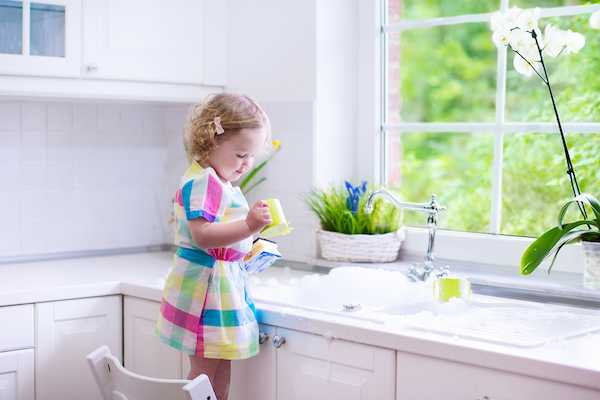Full disclosure: my kids, up until now, have rarely done chores. It always seems so much easier to pick everything up myself at the end of the day. Especially when making them put away their own toys requires so much argument, negotiation, cajoling and “helping” that bedtime gets pushed back.

But here’s what I’ve recently learned: Housework is as essential to your child’s well-being as a seatbelt or a toothbrush. Kids who do housework have higher self-esteem, more competent life-skills as adults and don’t look like dorks in front of their peers when they’re the only ones who don’t know how to button their own coats, make a sandwich or brew Mommy a coffee. By not forcing your children to do housework, you threaten your child’s future attractiveness as a roommate, romantic partner or colleague.
Here are 10 ways to train your child into being a confident, responsible, in-demand adult.
1. Make a training video
This combines two of my kids’ special joys – using mummy’s phone and being the boss. Kid #1 (or a parent) can do the filming, while Kid #2 demonstrates exactly how to find pyjamas on the floor, turn them right side out, then fold and put away. It’s especially good for tasks where kids do a sloppy job and you want to up the quality or for giving younger siblings a turn at playing expert. Of course, sisters will always find ways to exploit brothers, as in this snow shoveling video. But brothers can also learn to negotiate a turn behind the lens, another valuable skill for adulthood.
2. Mini Size It
My kids can’t get enough of child-sized chairs, brooms, shovels, pieces of broccoli …you name it. If it’s tiny, they want it. Honour their small selves with mini-sized adult tools, rather than plastic toy versions that break too easily. If they have to be very careful not to hurt themselves with the shovel, that just ups the appeal.
“Offering a child a quality and useful tool conveys the respect and confidence we have for them,” says Jamie Martin, of SteadyMom.com. “Think about how frustrating it is to use a dull knife or pair of scissors.” It will be such a thrill to use “dangerous” tools, they’ll forget all resistance.
3. Impose a housework regime gradually
Resist the urge to impose a new order overnight. Experts say it’s easiest to start them young before they recognize the difference between work and play and are still eager to help with the dishes. If you’ve already missed the prime toddler “helping” window, (i.e. warned your toddler not to ever, ever touch the spray nozzle again) your kids may find any request profoundly unfair and worthy of civil disobedience. Stay the course and remember the long game. Start in teeny tiny increments, beginning with personal tasks and gradually moving to chores that contribute to the general family order.
For example, start with putting away boots and outerwear every time they return home and before they get a snack, screentime or supper. When this is a habit, add putting dirty clothes in hamper every night before bed.
The key is to make like a glacier, says Cynthia Ewar of OrganizedHome.com. It might take a few months (or years) to build up to washing, folding and putting away, but the pay-off of having teenagers do their own laundry will be worth it.
4. Deadlines, deadlines!
Why should grown-ups have a monopoly on the adrenaline rush that goes with deadlines? Kids enjoy a good panic too. Let’s say, you’ve adopted a no-nag policy (you’re amazing, by the way) and all the chores you’ve assigned throughout the week have not (gasp!) been completed. Everyone is forgiven, so long as all tasks are complete by… Saturday noon! Go! Not only is it more fun to race against the clock, it’s also fun to compete with siblings or work alongside mom and dad to avoid the peril of undone chores. Consider adding an incentive – pizza for dinner, movie night with popcorn – if all jobs are done before the buzzer sounds.
5. Housework needs a soundtrack
Using different genres of music to accompany desk work or workouts is a common sweetener for tasks adults tend to procrastinate. Let kids take turns playing DJ. You may be surprised at what they think is the best playlist for dustbusting.
6. Acting Like Housekeepers
Maybe your kids don’t like loading the dishwasher, but what about robots? Or cowboys? Or monkeys? I’ve heard they love cleaning up. Younger kids enjoy most activities when accompanied by silly voices and distinctive walks; housework is no exception. Older kids may enjoy being the boss of their own cleaning business, complete with uniforms, a special cart and a fussy customer – you.
7. Make Chores Fun

Cutesy gimmicks aren’t going to work every time, but every now and then try turning clean-up into a game. The boys in this video may be missing a few spots on the floor, but they’re still improving their Swiffer-handling skills and enjoying some active family time.
Other options to get your kids excited about chores? Make repetitive tasks easier to endure with a chore punch card, add the thrill of the unexpected to chore time with a spinning wheel of chance or let them try their luck with dice.
8. Payback time
Why put away their little cars, game pieces or cell phone again, when you can confiscate? Every time you find something left out, hide it away and then have your kids do a job to earn the beloved object back. You could have a pre-made stash of extra chores attached to to your impound lot, as this mother did. Or use weekly chores as payment for chauffering to playdates or other activities.
9. Raise Expectations
This one is counter-intuitive. If your kids are resisting or complaining about chores, make them tougher. When we’ve mastered a task so well we could do it in our sleep, we get bored. Jobs that require our full attention bring us back to that all-important present moment. They also give us a greater sense of accomplishment and allow us to feel like a valuable member of the team. So grit your teeth and hand over a job you’re not quite sure they can handle. Scrubbing the whole bathroom, for example, including the toilet. Or scraping the plates into compost and finding enough matching lids to store leftovers in containers. My kids actually puff out their chests and patronize me when I entrust them with more difficult jobs – surely the highest form of thanks a parent can get.
When you get frustrated, remember: every minute you spend building housework habits now is a gift to your child’s future housemates.

